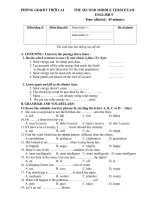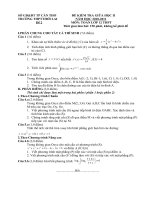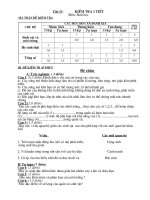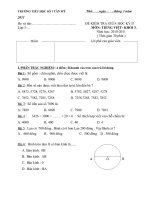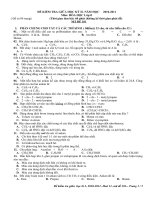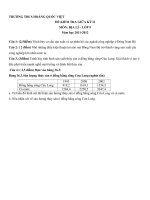De kiem tra giua HK2- AV 9
Bạn đang xem bản rút gọn của tài liệu. Xem và tải ngay bản đầy đủ của tài liệu tại đây (116.36 KB, 6 trang )
PHÒNG GD&ĐT THỚI LAI THE SECOND MIDDLE TERM EXAM
ENGLISH 9
Time allotted : 45 minutes
Điểm bằng số Điểm bằng chữ
Giám khảo 1:
…………………………
Giám khảo 2:
……………………………………………………………………
Mã số phách
Thí sinh làm bài thẳng vào đề thi
A. LISTENING : Listen to the passage three times :
1. Decide which sentence is true (T) and which is false (F) (1pt):
1. Solar energy can be cheap and clean. …………
2. Ten percents of the solar energy that reach the Earth …………
is enough to provide power for the total population.
3. Solar energy can be used only on sunny days. …………
4. Solar panels are placed on the roof of a house. …………
2. Listen again and fill in the blanks (1pt):
5. Solar energy doesn’t cause ………………
6. The electricity could be provided by the……………
7. Many …………… are already using solar energy.
8. We can use solar energy on……………… days.
B. GRAMMAR AND VOCABULARY:
1.Choose the suitable word or phrase by circling the letter A, B, C or D : (3ms)
9. She was so surprised to see the bill that she…… … onto the floor.
A. fell B. fall C. felt D. fallen
10. He ……. a letter from her yet.
A. won’t receive B. didn’t receive C. hasn’t receive D. don’t receive
11. If I have a lot of money, I ……… travel abroad this summer.
A. can B. will C. do D. might
12. Find the word which has the stress pattern different from the others:.
A.contribution B. pollution C. celebration D. generation
13. She looked at me…………………when I came home late.
A. happily B. angry C. angrily D. happy
14. Mary is one of the ………………… students of our class.
A. most intelligently B. most intelligent C. more intelligently D. more intelligent
15. It’s too dark in the room. Can you turn………………the lights?
A. on B. or C. off D. at
16. A dripping faucet can……………….a lot of water.
A. use B. save C. take D. waste
17. You should get a……………………to check the pipes.
A. mechanic B. worker C. plumber D. waiter
18. What will happen if the pollution……………………on?
A. puts B. goes C. takes D. keeps
19. Let’s go out ……………….dinner.
A. to B. with C. have D. for
20. Nowadays, everyone is interested in…………………energy.
A. saving B. save C. to save D. saves
2. Complete the sentences using “and, but, so, because, however” (1pt) :
21. It rains a lot, …………………we enjoyed the vacation very much.
22. I like oranges ……………….apples.
23. She went home……………… she was tired.
24. The weather was terrible, ……………… we didn’t enjoy the picnic.
C. READING: Read the passage carefully :
Why did English become the international language? In the middle of the
nineteenth century, French was the international language. Then Britain became very
powerful in the world. By 1900, England had colonies in other parts of Asia, Africa
and South Pacific. The people in the colonies had to use English. Slowly it became
more important than French internationally. After the Second World War, the United
States became very powerful, and even more people began to learn English.
English is the native or official language on one-fifth of the land area of the
world. It is spoken in North America, Great Britain, Australia and New Zealand. In
South Africa and India, it is one of the official languages.
More people study English than any other languages. In many countries, the
textbooks in universities are in English. More than three-fourth of the world’s mail is
in English. More than three-fifth of the world’s radio stations use English, too.
( Note: - colony (n): thuộc địa)
1. Choose the best answer A, B, C or D for each question (1pt) :
25. Which language was the international language in the middle of the nineteenth
century?
A. English B. French C. Chinese D. Japanese
26. The people in the colonies of England had to use…………………………….
A. Vietnamese B. English C. French D. Italian
27. Where is English used as the native language?
A. New Zealand and Great Britain B. India and North America
C. South Africa and North America D. A and C are correct
28. How many percents of the world’s mail are written in English?
A. more than sixty percents B. more than fifty percents
C. more than seventy-five percents D. more than twenty-five percents
2. Answer True or False (1pt):
29. England had colonies in other parts of Asia, Africa and South
Pacific by 1900. …………………………
30. In a few countries, the textbooks in universities are in English. …………………………
31. English is the native or official language on two-fifth of
the land area of the world. …………………………
32. The world’s radio stations don’t use English. …………………………
D. WRITING:
1. Write sentences with the cues given (1pt):
33. If/ homework/ not be / long and difficult/ I/ finish/ on time.
………………………………………………………………………………………
34. We/ can/ not go/ a walk/ because/ it/ rain/ heavy.
………………………………………………………………………………………
35. His parents/ be happy/ as/ he/ get/ good job.
………………………………………………………………………………………
36. If/ I/ win/ this competition/I/ give/ the award/ to/ the unlucky/ people.
………………………………………………………………………………………
2. Rewrite the sentences, beginning as shown, so that the meaning stays the
same (1pt):
37. You must study harder or you will fail in the next exams.
* If ……………………………………………………………………………………………… ……………………………………………………………
38. There wasn’t enough rain last year, so the crops were not good.
* The crops ………………………………………………………………………………………………………………………………………….…
ANSWER KEYS:
A. LISTENING:
1. Decide which sentence is true (T) and which is false (F) (1pt):
1. T
2. F
3. F
4. T
2. Listen again and fill in the blanks (1pt):
5. pollution.
6. sun
7. countries.
8. cloudy
B. GRAMMAR AND VOCABULARY :
1.Choose the suitable word or phrase by circling the letter A, B, C or D : (3ms)
9
A
15
A
10
C
16
D
11
B
17
C
12
B
18
B
13
C
19
D
14
B
20
A
2. Complete the sentences using “and, but, so, because, however” (1pt) :
21. however. 22. and 23. because 24. so
C. READING: Read the passage carefully :
1. Choose the best answer A, B, C or D for each question (1pt) :
25. B. French
26. B. English
27. D. A and C are correct
28. C. more than seventy-five percents
2. Answer True or False (1pt):
29. T 30. F 31. F 32. F
D. WRITING:
1. Write sentences with the cues given (1pt):
33. If the homework isn’t long and difficult, I will finish on time.
34. We can not go for a walk because it rains heavy.
35. His parents are happy as he gets a good job.
36. If I win this competition, I will give the award to the unlucky people.
2. Rewrite the sentences, beginning as shown, so that the meaning stays the
same (1pt):
37. If you don’t study harder, you will fail in the next exams.
38. The crops were not good because there wasn’t enough rain last year.
THE END
LISTENING ( Three times)
Are you looking for a cheap, clean, effective source of power that doesn’t
cause pollution or waste natural resources? Look no further than solar energy from
our sun. At present, most of our electricity comes from the use of coal, gas, or
nuclear power. This power could be provided by the sun. One percent of the solar
energy that reaches the Earth is enough to provide power for total population.
Many countries are already using solar energy. Solar panels are placed on the
roof of a house and the sun’s energy can be stored for a number a day, so on cloudy
day you can use solar energy too.
Sweden has an advanced solar energy program. There all buildings will be
heated by solar energy and cars will use solar energy instead of gas by the year
2015.
LISTENING ( Three times)
Are you looking for a cheap, clean, effective source of power that doesn’t
cause pollution or waste natural resources? Look no further than solar energy from
our sun. At present, most of our electricity comes from the use of coal, gas, or
nuclear power. This power could be provided by the sun. One percent of the solar
energy that reaches the Earth is enough to provide power for total population.
Many countries are already using solar energy. Solar panels are placed on the
roof of a house and the sun’s energy can be stored for a number a day, so on cloudy
day you can use solar energy too.
Sweden has an advanced solar energy program. There all buildings will be
heated by solar energy and cars will use solar energy instead of gas by the year
2015.
